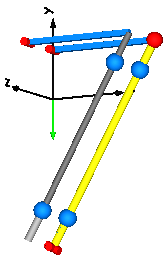It is demonstrated how to implement line force components that
shall have mass properties. Two alternative implementations are
given:
- With
JointUPS:
Modelica.Mechanics.MultiBody.Joints.Assemblies.JointUPS is an
aggregation of a universal, a prismatic and a spherical joint that
approximates a real force component, such as a hydraulic cylinder.
At the two frames of the prismatic joint (frame_ia, frame_ib of
jointUPS) two bodies are attached. The parameters are selected such
that the center of masses of the two bodies are located on the line
connecting frame_a and frame_b of the jointUPS component. Both
bodies have the same mass and the inertia tensor is set to zero,
i.e., the two bodies are treated as point masses.
- With
LineForceWithTwoMasses:
Modelica.Mechanics.MultiBody.Forces.LineForceWithTwoMasses is a
line force component with the built-in property that two point
masses are located on the line on which the line force is acting.
The parameters are selected in such a way that the same system as
with the jointUPS component is described.
In both cases, a linear 1-dimensional translational damper from
the Modelica.Mechanics.Translational library is used as line force
between the two attachment points. Simulate this system and plot
the differences of the cut forces at both sides of the line force
component ("rod_f_diff" and "body_f_diff"). Both vectors should be
zero (depending on the chosen relative tolerance of the
integration, the difference is in the order of 1e-10 ...
1e-15).
Note, that the implementation with the LineForceWithTwoMasses
component is simpler and more convenient. An animation of this
simulation is shown in the figure below. The system on the left
side in the front is the animation with the LineForceWithTwoMasses
component whereas the system on the right side in the back is the
animation with the JointUPS component.

Generated at 2020-06-05T07:38:22Z by OpenModelica 1.16.0~dev-420-gc007a39